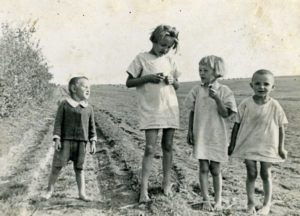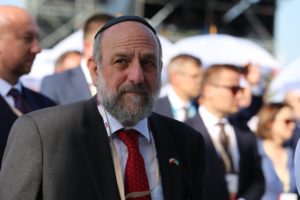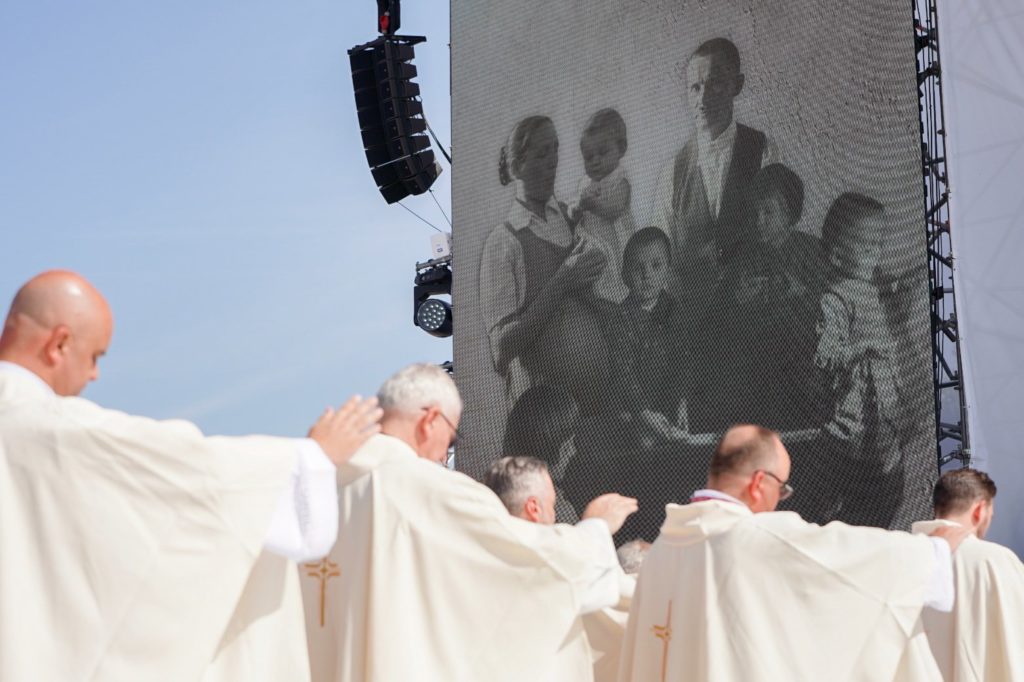This month, the illustrious ranks of beatified Poles grew by nine.
On Sunday, Sept. 10, Józef and Wiktoria Ulma and their seven children — Stanisława, Barbara, Władysław, Franciszek, Antoni, Maria, and an infant whose name isn’t known to history — were officially declared “blessed” in a special ceremony in their home village of Markowa, Poland.
German gendarmes murdered the entire family in March 1944 in retaliation for the Ulmas’ sheltering of Jews. Their beatification process began in 2003, and Pope Francis declared them venerable last year.
The Ulma family owned a modest farm in Markowa in the Subcarpathian (currently southeastern) region of Poland, to this day a stronghold of Polish Catholicism. Józef was an amateur photographer and active member of community and church organizations. His photographs offer precious insights into the life of this family of martyrs.
The children knew only a world at war. The oldest, Stanisława, was just three when the Germans and Soviets carved up her homeland.
At the Wannsee Conference in 1942, senior German leadership resolved to deport and murder Europe’s Jews. Later that year, the Ulmas began to hide eight Jews on their farm, an act punishable by death in occupied Poland. Additionally, Józef helped build a shelter in a nearby ravine, to which Wiktoria delivered food to four Jewish women in hiding. German authorities discovered and murdered those women in December 1942. The eight endured with the Ulmas until March 1944, just four months before Soviet forces arrived in the area.
A local man, Włodzimierz Leś, informed the German authorities about the Ulmas’ charity, likely due to a personal dispute. Leś previously sheltered one of the Jews in hiding in exchange for valuables. A dispute over the possessions likely spurred his denunciation. Elements of the Polish underground observed Leś for the remainder of the war. They tried and shot him in September of that year.

After the denunciation, a patrol of German gendarmes arrived at the Ulma farm in the early hours of March 24, 1944. After shooting some of the fugitives in their sleep, they led the remaining inhabitants outside. First they shot the remaining Jews, then they murdered Józef and Wiktoria in front of their children. Initially unsure what to do with the children, the Germans soon shot them as well, “so there would be no trouble.” Later examination of the bodies suggested Wiktoria had partially given birth (the Vatican has clarified that this child, too, will be officially counted among the beatified).
“Look how the Polish pigs that shelter Jews are dying!” exclaimed one of the German perpetrators during the proceedings. The gendarmes proceeded to loot the farm and drown their consciences in vodka. A hidden photograph of two Jewish women was found with stains of a victim’s dripping blood.
That stained photograph proved symbolic of a time and place: The leadership of Poland’s Nazi occupiers envisioned a future in which a portion of the Slavs would survive as a slave race with minimal education; the rest would be exterminated, along with the Jews.
Of the numerous countries that Germany occupied during the war, only in Poland did civilians face execution for aiding Jews. Whereas the occupied peoples of Western Europe maintained a semblance of normal life, Poles could take nothing for granted. Ultimately, 6 million people — one-fifth of the country’s prewar population — perished during the war.
The German occupiers’ official suppression of human dignity unleashed a barbaric tide throughout society. The Holocaust was a central part of it but not the only one. Ukrainian paramilitaries murdered tens of thousands of Poles in the Polish-Ukrainian borderlands. Scoundrels thrived. Some — ostensibly including the neighbor who reported the Ulmas — were willing to play the executioner for little in return.
These conditions also kindled the best in humanity, as demonstrated by this now-beatified farm family. The underground organization Żegota, unique in German-occupied Europe, existed for the purpose of saving Jews. Tens of thousands benefited from the organization’s aid. Poles comprise the largest nationality of the Righteous Among Nations.

Nearly 80 years later, Poland’s Sejm (Parliament) announced the Ulma family would be among its patrons for the year 2024.
But the Ulmas’ beatification comes at a time when their witness to the sanctity of life is particularly relevant in Poland. Abortion has been a key issue in this year’s contentious election campaign, with opposition leader Donald Tusk announcing that candidates on his party’s parliamentary list must support abortion. A large-scale pro-abortion rally is being planned in Warsaw two weeks before the October elections.
Meanwhile, following the postwar redrawing of borders, the Ulmas’ Markowa now sits very close to the Poland-Ukraine border, across which hundreds of thousands have fallen victim to the region’s greatest conflagration since World War II.
But the Ulmas’ beatification reminds us how the simplest and smallest among us can testify to Christ’s love.
History offers few details of what went through Józef and Wiktoria’s minds when deciding to undertake their selfless acts of charity. Likewise, the modern observer knows little of the hardship they undoubtedly faced. What do remain are photographs of a beautiful family, a testament to life and love.
In one of these surviving photographs, taken soon before the family’s death, a visibly pregnant Wiktoria tends to an infant, a loving sister feeds her young sibling, and the remaining children cast their gazes in every which direction. Józef stares knowingly into the camera, as if to say, on behalf of the family, a humble yes.

